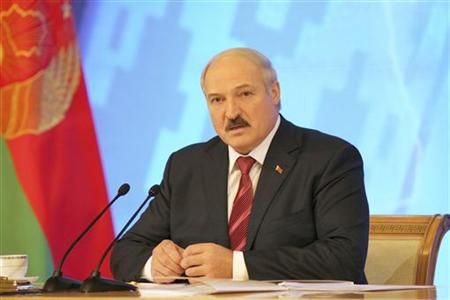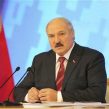
Return of EU Ambassadors to Minsk
Publication: Eurasia Daily Monitor Volume: 9 Issue: 82
By:

The release of two political prisoners over the Orthodox Easter weekend, followed by the gradual return of the European Union ambassadors to Minsk (they departed en masse on February 28) has prompted supposition about the effectiveness of the relatively harsh sanctions against the Belarusian regime. Thus the “concession” on the part of President Alyaksandr Lukashenka to release Andrei Sannikau and Dzmitry Bandarenka could be perceived as a direct result of the firm stance taken by the EU. And indeed sanctions may have played some role. But it is doubtful that the Belarusian president took the step solely because of EU pressure. In fact, the move was carefully calculated and was even to some extent predictable.
The president explained it as follows: he released the two prisoners on April 14 because they had both asked for pardons. One was demonstrably sick (Bandarenka), while the other has a young son and thus his release served as an act of compassion to allow the family to be reunited over the Easter weekend. He also explained in an interview that he had little sympathy for them in terms of their past behavior and that if Sannikau chose “to blabber” he would quickly find himself detained once again (Democraticbelarus.eu, Apr 23). It is harder to explain the gap between the requests for a pardon – made initially on November 20 in the case of Sannikau (Belsat TV, April 17) – and the release, and here the logical deduction is that the timing was indeed chosen to coincide with the demands of the EU. But the step was carefully considered and not part of a general plan to release all remaining political detainees. In short, the President agreed to the release but waited for the appropriate moment to put it into effect.
Subsequently, a request by Christian Democratic Party co-leader Pavel Sevyarynets for early release from his penal colony was brusquely rejected, precisely because he had not acknowledged his guilt (Narodnaya Volya, April 27). Likewise it seems that other prisoners who have not responded to state brutality and pressure, like the remaining presidential candidate Mikalay Statkevich or youth leader Dzmitry Dashkevich, are unlikely to be set free until they do so. The more high profile Ales Byalatsky, head of Vyasna, ostensibly has more hope of early release because he is a better “bargaining chip” for the authorities, providing hope that there will be some concession in return (an easing of sanctions, reduction of the travel ban list, etc.).
The personal interest of Lukashenka in the cases of individual prisoners is increasingly apparent. The task of the KGB is first and foremost to “break” the prisoners, by any means, including torture and threats to family members, isolation or putting them in rooms with security leaders known for their harsh interrogation techniques. Sannikau indicated to his wife last January that he could be “killed at any time” (RFE/RL Belarus Service, January 25). Once broken, the initial task is to persuade the prisoner to ask the President for a pardon, essentially an admission of guilt, in which case the subject is dependent on the Belarusian leader even when released from captivity and thereby nullified or weakened as a political force. The admission of guilt is critical – even if the prisoner is released, and for whatever reason. That is why the EU’s demand for the full release of all prisoners unconditionally is quietly ignored.
From the Belarusian perspective, this is a winnable game of political chess in which the moves of the opponent are all too predictable because they are based on moral standards, but which are largely unrecognized in this post-Soviet country. Upon his release, Sannikau stated: “I think we are witnessing a game” (RFE/RL Belarusian Service, April 15). The diminishing support for EU policy within Belarus is reflected in the March 2012 IISEPs poll that showed a sudden rise in the number of respondents who supported integration of their country with Russia (45.3 percent), with 35.3 percent opposed to unification (Angus Reid Global Monitor, April 14). The prestige of the EU, correspondingly, has fallen.
There may be several reasons for this latest development, of which the following should be considered most likely. First, diplomatic attempts to punish Belarus by the departure of the 27 EU ambassadors – Lukashenka asked only the Polish ambassador and EU delegate in Minsk to return to their capitals – have not worked. The ambassadors, after all, represent their countries; they do not pay salaries or pensions or supply goods to stores. The spat is unrelated to the direct concerns of the population. It seems moreover like an overreaction, particularly when one compares the response to events in other Eastern Partnership (EaP) countries, such as Ukraine where the regime has jailed several opposition leaders but was still allowed to initial an Association Agreement with the EU on March 30 (RIA Novosti, March 30). Another EaP member, Azerbaijan, is currently discussing an associative agreement with the EU despite a record on human rights considerably worse than that of Belarus (https://www.hrw.org/europecentral-asia/azerbaijan).
Second, the EU has offered Belarus very little in terms of material incentives while demanding that the regime democratize. Increasingly, therefore, the average resident is likely to deduce that even a bad deal with Russia is preferable to no deal at all with the EU. The Russians have various integrationist institutions in place and plainly they would like to embrace Belarus. In fact the Eurasian Economic Community has claimed that sanctions against Belarus harm the business interests of all members of the association (BD Delovaya Gazeta, April 26). By contrast the financial inducements of the Eastern Partnership hardly suggest that Brussels is genuinely interested in Minsk as a neighbor or prospective partner. Of the total of $2.5 billion designated for 2011-2013 for a variety of projects, none is destined for Belarus because no Memorandum of Understanding has been signed to date with Minsk (https://www.easternpartnership.org/content/eastern-partnership-funds).
In turn, the President gains popularity by focusing on the “duplicity” of the policies developed by Brussels and attributing economic failures to vindictive maneuvers made in foreign capitals. It is a simple matter to link devaluations of currency and other problems to enhanced sanctions against Belarusian companies. It is also a logical stance to point out the inconsistencies in EU treatment of EaP member states. Belarus, declares Lukashenka, is ready to sit down and discuss any issue with the EU as long as there is not any form of pressure (Telegraf.by, April 26). Until then, he will continue the chess game, which the EU seems only too willing to play, thereby agreeing implicitly that political prisoners are no more than pawns to be sacrificed or saved. From Brussels’s perspective, while everyone should be happy to see Andrei Sannikau and Dzmitry Bandarenka free, there should be no self-delusion as to why it has occurred.




